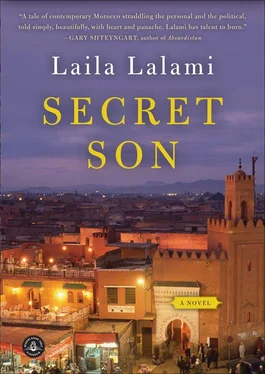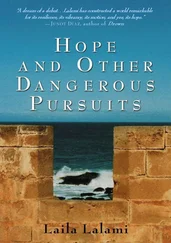Youssef turned around and stared Amin down. The others — Simo, Mounir, Rachid, and his brother — looked up, and they all got up to say hello. While they were still exchanging salaams, Amin approached. “What are you doing here?”
“What do you care?” Youssef replied.
“This is our café. You have no business here.”
“What’s going on, my brother?” Simo asked.
“This is a public space,” Youssef said. “I can sit here if I want.”
Amin grabbed Youssef’s table and shook it from right to left, knocking down the glasses. “Get out,” he said. At the sound of the glass breaking, Hatim folded his paper and sat up in his chair. Youssef’s other friends looked confused by the argument.
“Look what you’ve done,” Youssef said, his voice trembling. He pushed the shards of glass away from the edge of the table so they would not fall on the floor, where they might injure someone.
“Get out,” Amin said between his teeth. In his eyes was a determination Youssef had never seen; he looked like a stranger.
Suddenly, Youssef had the horrible feeling that his coming here had been a bad idea. But now that he had provoked the confrontation, he could not walk away from it. “I’m not going anywhere.”
Amin shoved him; Youssef shoved back. Their friends restrained them, but Amin managed to break free and grab Youssef by the collar. Finally, Maati broke through the crowd. “What’s going on here?” He held Amin back. “Leave him alone.”
“Tell him to get out.”
“He’s not going anywhere.”
Amin lunged at Youssef, but Maati grabbed him by the waist and easily pushed him back. “If you can’t control yourself, I’ll have to take you out. Why don’t you just go back to your seat?”
“Son of a whore,” Amin said. The insult was not meant for Maati.
Hatim stood up. “Calm down, Amin. There’s no use for that kind of language.”
“Hadak lehmar,” Amin screamed, “he doesn’t belong here. Tell him, Hatim, tell him.”
Hatim spoke in a steady voice. “I told you there’s no use for that kind of language. Either go back to your table, or leave. We don’t want any trouble here.”
Amin stormed off, followed by his two friends. Youssef took a deep breath of relief, grateful to both Maati and Hatim for having defended him. With a snap of his fingers, Hatim signaled to the waiter to come clean up the mess, and Youssef, still shaking with anger, took his seat at the table. Hatim put a hand on his shoulder. “How have you been? We haven’t seen you here in a while.”
There was something in Hatim’s voice that made it difficult to lie to him, but Youssef had no choice. “I was just staying with my mother’s cousin.”
“I heard you had a job,” Hatim said. “In a hotel?”
Hatim never left this building, it seemed, and yet he, too, had heard the story of the job in Marrakech.
“I did. But I lost my job, so I’m back.”
“Meskiin. Did they tell you why they fired you?”
“No.”
“And you didn’t do anything, did you?”
“No,” Youssef said indignantly. He looked up at Hatim now, ready to defend his record, ready to share the madness of what had happened, but Hatim didn’t appear to be interested in the details. “I can’t tell you how many cases like this I hear about every day,” he said. “The injustice in this country boggles the mind. If people only knew what was happening around them — but they don’t. This country is like a car going down a ravine, and everyone’s asleep in the backseat.” Youssef nodded, his pain having found a home in Hatim’s words.
IT WAS JULY. In other parts of Casablanca, jacaranda trees were shedding their purple blossoms, yielding a soft, sweet smell, but here in Hay An Najat, houseflies thrived, growing bigger and bolder. They grazed on piles of trash, competing with sheep and cows for tea grounds, vegetable peels, and empty containers of yogurt. Mosquitoes appeared, and flying ants, and gray moths, and gnats. Meanwhile, men still sold fish at the market, women still worked in the textile factories, and children still stood at street corners.
Youssef’s mother wanted him to return to college in the fall, but he knew it was a waste of time. He had missed classes for most of the previous year, and he hadn’t sat for his final exams. “You can repeat the year,” she said, chewing on her lower lip. “That’s fine. What matters is to stick with it until you get your degree.” He tried to imagine what it would be like to return to campus, with new classmates but the same curriculum. It was already painful enough to know that he had made a terrible mistake by dropping out, but going back to school meant being reminded of that mistake every day. He could not bring himself to do it.
Two days later, she came up with a new idea. “Why don’t you start over with a different major?” she said. He tilted his head, unsure what to say. What difference would it make if he switched to history, French, or anthropology? His father’s friends called universities “jobless factories” for a good reason. Faced with his silence, her suggestion quickly became a plea: “Maybe you could take the schoolteacher’s exam?” Youssef did not have the heart to remind her that Rachid’s brother had done precisely that, but had been idle since graduation; the Ministry of Education had yet to place him in a school.
At dinner, she persisted. “You could try another college,” she said. But Youssef had come to believe that degrees did not matter. Smarter people than he, people with engineering or medical degrees, could not find jobs. They sat in the same cafés as the dropouts and the illiterates. Except for Maati, everyone Youssef knew, every single one of his friends — Amin, Simo, Mounir, Rachid — was jobless. When he pointed this out to her, she gave him one of her wistful looks.
One day she suggested that he sit for the police academy exam at the Royal Institute of Police in Kénitra. After the terrorist attacks of May 16, she said, the government had invested massive amounts of money in security. “This is your chance,” she explained. “So many police jobs are opening up that there’s no need for connections, just a willingness to work.” One of her co-workers’ sons had taken the exam and was now an officer in Aïn Diab. If Youssef passed the exam, he, too, would have a state job, which meant a salary, health benefits, and a pension.
He tried to imagine himself in the police academy. Here, in the neighborhood, everyone hated the police — men who never showed up when they were most needed, but were always around when they were least wanted. It would never have occurred to Youssef to apply for a job with them, and his mother knew that. But if what she said was true, then why not? It would be better than sitting at home, watching her worry herself to death about his life. She was as frail as ever. Crow’s-feet had deepened around her eyes, and he had noticed what he feared was a nascent hunchback, the result of all those evenings spent on her embroidery. Still, there was dignity in the way she carried herself, a refusal to be bent to the will of others. She had pulled off an incredible act all her life, and she had almost succeeded. In spite of all his disagreements with her, he could not help admiring her. “All right,” he said. “I’ll take the exam.”
“May God bring you success,” she said. She rolled up her shirtsleeves to start preparing their meal. He wanted to ask her why she had never married, but the usual sense of propriety stopped him. He had never heard anyone discuss the topic of a mother’s romantic life, and even if he could, he would not find the right words in his vocabulary to speak of such things. Mothers were mothers: they cared for children, sacrificed for them, worried about them. It was in the order of things, as old as the world itself. Yet the way he had treated his mother was not in the order of things. He had met her love with denial, and her pleas with contempt. He had gone searching for a father instead. A crushing feeling of guilt descended upon him. He promised himself he would not let her down any longer.
Читать дальше












